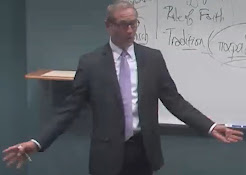- - - - - - - - - - - - - - - - - - - - - - - -
Regula fidei / Tradition
[42:39] This really is the fundamental thing. And if we didn't have a Bible, would we still have this? [pointing to "Rule of faith" on whiteboard] We would! [i.e. Christianity is NOT dependent on the Bible.] Because this [regula fidei / Tradition] precedes the Bible. [This reminds of the teaching of Martin Scharlemann before his “apology” to the Synod where he said “The Biblical documents offer us, therefore, personal testimony, with an interpretation of events… This is the sense in which they are inspired.” Walther, in his convention essay to the Eastern District in 1867 p. 24, spoke of the transfer of the Word of God from the oral transmission to the written word. See later blog series Part EC9.]
[42:52] This is already in place when Paul is in Corinth, and when Paul is in, in wherever he is, in Ephesus this is already in place, and this is what Paul's teaching now. [Biermann can call on neither the Lutheran Confessions, nor Luther for his assertion. Rather the Confessions (FC Source & norm, 9) clearly refute him. If he does call on the Confessions or Luther, he will twist them also. But Biermann does not call on them here, but condemns himself saying “in my opinion.” @42:05 mark]
[42:59] Couple more things before I start fielding questions. This ["rule of faith"/Tradition] is not at odds with the Bible [why would he say this if not because it clearly is at odds?] because what is the Scripture? [Scripture is what Scripture says it is] The Scripture essentially is the recorded facts of this narrative, it's laying it down. [“Given by inspiration of God”??] So everything that we have recorded in New T[estament] and OT, (we'll get to [Brevard] Childs in a minute), everything that's recorded there is in sync with this, and in fact now because the Scripture is this authoritative text for us because it is trustworthy, comes from the apostles, fits in with this analogy of faith.
“Reciprocity”?
[43:30] Now there's a reciprocity [“reciprocity” = a mutual dependence, which means Holy Scripture is dependent on “Tradition”], where we make sure that the rule of faith is being checked by the Scripture. So there is a reciprocity thing going on here, so the Scripture shapes and forms and norms this especially the further away we get from the Apostles. Because we don't have Apostles running around to say now is this lining up? Paul said this, what do you think about that? Peter, Peter's dead, now what?
[43:55] Well now we have, have text. Now we have Mark. Now we have Paul's text. Now we can say, okay, let's check out with it, let's verify this with Romans, lines up, that's cool, that's good. Now, so that's important.
[44:04] Second thing to say before we, I'll field some questions. This [regula fidei / Tradition] is difficult and scary especially if you are a rationalist, because where is the exact list of everything in the analogy of faith? Because we don't have it. It's part of this oral tradition, and was the church in the beginning oral? Absolutely! [i.e. not just Scripture but oral tradition; see above @42:39.] That's the whole point of the paradosis. You had it passed on by oral teaching. How many things did Jesus write? Oops, oh He wrote in the sand one time, He doodled. We [garbled:] not, yeah, we're not even sure what he he was just drawing on the sand, maybe it was just hieroglyphs, who knows. He was just… so he gave, he left nothing in writing, nothing, nothing, it was all about the oral teaching.
[44:55] And so the writing [Holy Scripture] came only when it became necessary to make sure we don't lose the story, and the intact proclamation of this faith. [45:03] So this [“rule of faith” = Tradition] is the normative thing, but it's kind of fuzzy, and this freaks you out, if you're a rationalist [B. is apparently calling Christians who call Scripture "the normative thing" rationalists, those who cling to the written Word of God, and not Tradition. He is creating a strawman argument.]. You [rationalists] don't want fuzzy, you want clean, cut tight, neat, and solid, and that's why Scripture, it answers that, Scripture just tickles, I mean, scratches your itch, and if you got a rationalism itch [sinful itch], and we all do, Scripture is your perfect solution [to counter your (sinful) itch] now. I’ve got it, no more question, no more fuzziness, this [regula fidei] is inherently fuzzy, and it freaks out people who don't want fuzzy. [i.e. Christians for whom “these are written so that you may believe.” John 20:31]
[45:30] And that also means “is this [rule of faith] going to settle any disputes between different confessions in the church”? Not very well, but to a point. yeah!
[45:41] See that's when we start saying what has the church taught about these things [i.e. Tradition]. You say, well Irenaeus said this, yeah, but Tertullian said this. All right, but what did most people think later, who was right, Irenaeus or Tertullian? Well Tertullian was out to lunch, yeah, like often, he was. And so you see, in other words, there becomes a consensus. And that's one of the key words here [consensus, what the LC–MS considers its real authority. Luther had to fight with the "consensus" on the Lord's Supper.] with all this, is this idea of consensus. Well, consensus of whom? Those who are confessing Christ. Those who are following… and so this starts to become, it sounds a whole lot like the Church. [Consensus –> Church on whiteboard]
[46:11] And now, that really starts to scare Lutherans [growling tone; now Biermann is distinguishing himself from Lutherans.], starts to sound like the Roman Catholic Church tradition thing. You're putting tradition equal to Scripture. No we're not [Smokescreen!] but [but what?] we're saying nobody ever gets the Bible apart from this [pointing to “Church” on whiteboard] or apart from this [points to paradosis on whiteboard] ever! [B. makes no attempt to differentiate the Lutheran Church from the Roman Catholic Church on "Tradition".]
[46:28] And this is, this starts to belie also things like this whole Gideon's kind of attitude [B. now berates Gideons], you know, just hand somebody a Bible, have them read it cover to cover, and what you're going to get, you're going to be a confessing Christian, who's just like, I am. [False charge! Straw man argument! Gideons, nor Lutherans, say someone reading the Bible is automatically “going to be a confessing Christian”.] Isn't It's out there, right?
[46:43] If you would just read the Bible, honestly, you would confess everything exactly the way we do, really! No! That's stupid! [practically demonizes Bible readers!], ain't true, don't work. [I.e. NO ONE becomes a Christian by reading the Bible! But see 47:02 below where he retracts somewhat.] that way. Has anybody paid any attention to, you know, how people read text, and how you impose all your ideas on this stuff? Come on, so it doesn't work. [47:02] Now can the spirit work faith to somebody just picking up the Bible miraculously amazingly? Yes, He can even do that [but you just said “That’s stupid!”], but that's certainly not the norm [Biermann slams the practice of Bible distribution, then retracts somewhat, then explains the “Gideon’s kind of attitude” as if it is only handing out Bibles.].
"A congregation should be zealous to spread the written Word of God."







No comments:
Post a Comment
Comments only accepted when directly related to the post.